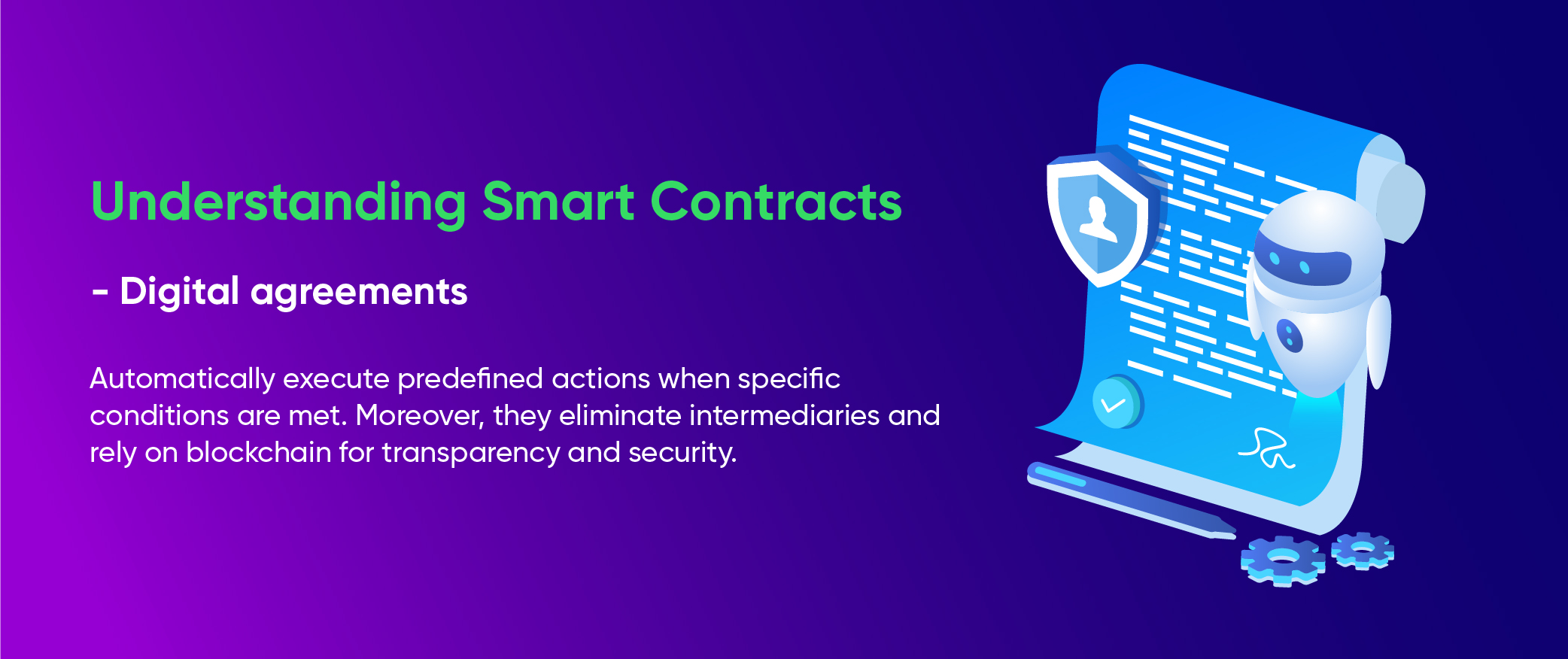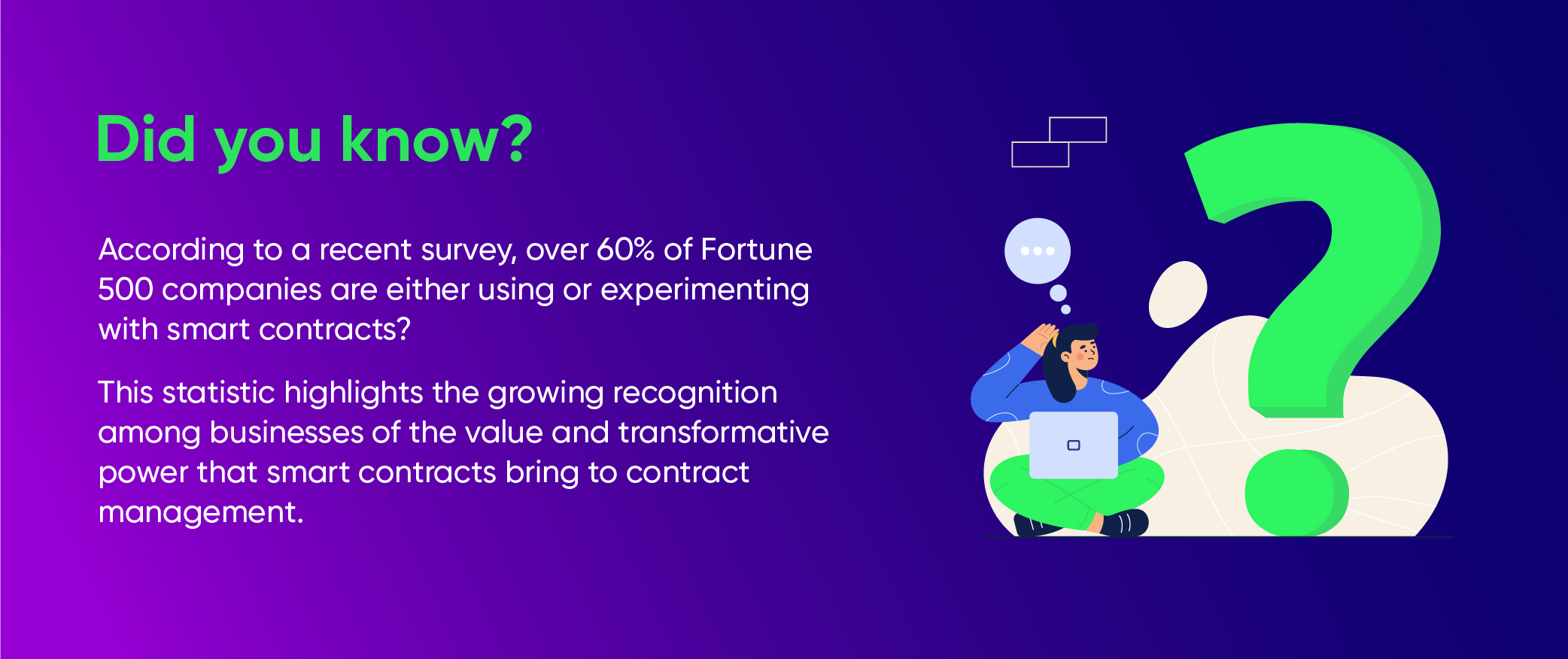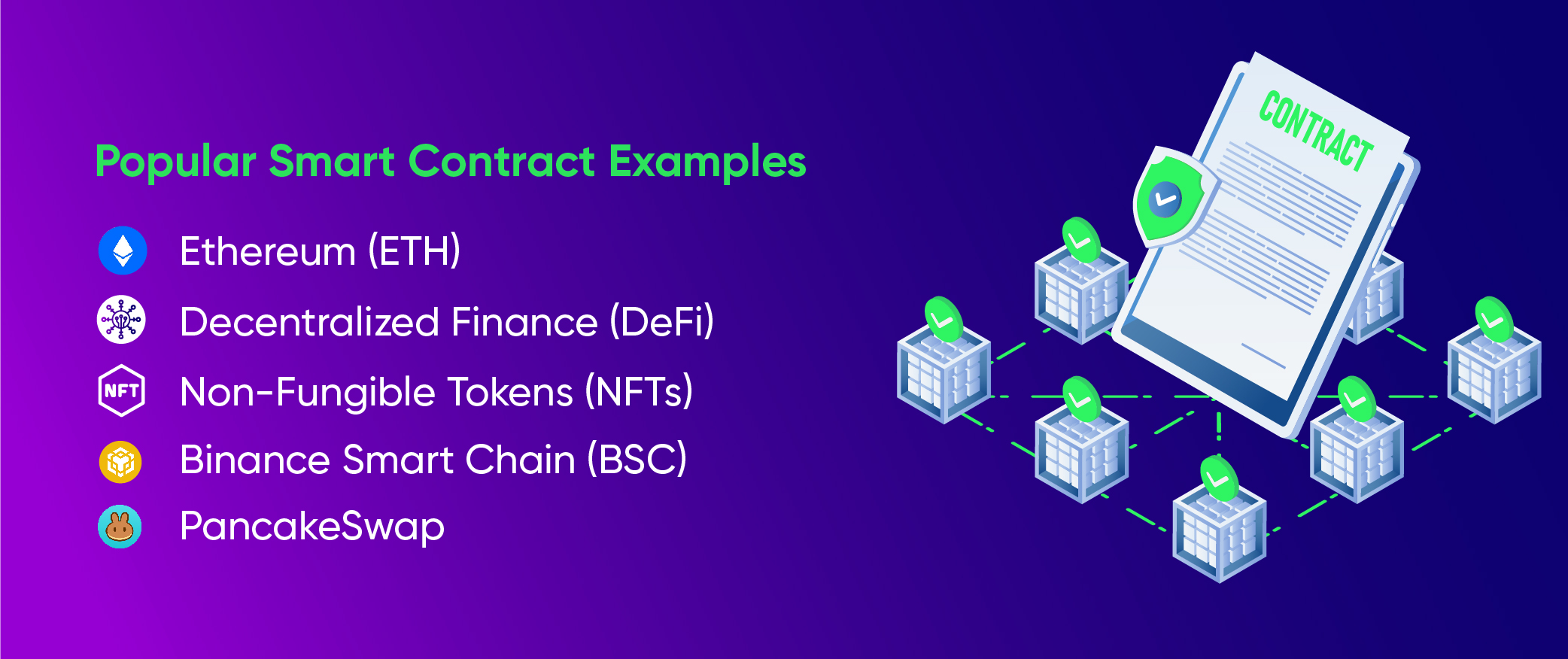
Introduction
Web3 & Blockchain Consultancy :
How do smart contracts work and how it is revolutionizing contract management?
In the landscape of contract management, smart contracts have emerged. These self-executing digital contracts are revolutionizing the way agreements are created, verified, and enforced. In this blog, we will explain what are smart contracts, how does smart contracts work, their functionalities, and the impact they have on businesses. Whether you’re new to the concept or seeking to enhance your understanding, join us on this journey to discover how smart contracts are transforming contract management. Let’s explore some technical aspects to demystify the foundational elements that power smart contracts.
Let’s explore some technical aspects to demystify the foundational elements that power smart contracts.
How Do Smart Contracts Work?
Smart contracts are often perceived as complex and mysterious, but by demystifying their inner workings, we can gain a better understanding of how they function.-
Decentralized Networks:
Smart contracts utilize blockchain technology and instead of relying on a central authority, the network consists of multiple nodes that validate and store the contract’s transactions.
-
Distributed Ledger:
The transactions and states of smart contracts are recorded on a distributed ledger, such as a blockchain. This ledger is shared among all network participants, ensuring transparency and eliminating the need for intermediaries.
-
Consensus Mechanisms:
This mechanism ensures agreement among network participants regarding the validity of transactions. Common consensus algorithms include Proof of Work (PoW) and Proof of Stake (PoS), which verify and secure the network by solving complex mathematical puzzles or by holding a stake in the blockchain.
-
Cryptography:
Cryptographic techniques verify the identity of involved parties. It includes; Public key cryptography – which enables participants to generate unique cryptographic keys: a public key for identification and a private key for authentication and encryption.
-
Event-Driven Logic:
Smart contracts can respond to external triggers, such as the completion of a payment or the fulfillment of certain conditions. When an event occurs, the contract’s code is executed, and the corresponding actions are performed.
-
Immutability:
Once deployed on the blockchain, smart contracts become immutable. The code and data cannot be altered or tampered with, providing transparency and trust in the contract’s execution.
-
Self-Executing Code:
Smart contracts contain self-executing code that automatically executes predefined actions when specific conditions are met. These conditions are typically written in programming languages specifically designed for smart contract development, such as Solidity for Ethereum.
Benefits of Smart Contracts
Smart contracts have a plethora of advantages for businesses across industries. Let’s explore some of the real-world benefits of smart contracts:Increased Efficiency:
- Automate contract execution
- Eliminating the need for manual intervention
- Reducing the time and effort
- Streamlined process to complete transactions
- Enhanced overall efficiency and productivity
Enhanced Accuracy:
- Elimination of manual entry
- Reduced potential human errors
- Pre-defined rules and conditions
- Accurate and error-free execution of contractual obligations
Cost Savings:
- Removing lawyers or brokers
- Reduce associated costs
- Automation of processes
- Elimination of manual tasks
- Lower operational expenses
- Increased cost savings over time
Reduced Fraud:
- Employ cryptographic security measures
- Tamper-proof and resistant to fraudulent activities
- Transparent and immutable
- Transactions cannot be altered
Transparency:
- Executed on a distributed ledger
- Accessible to all parties involved
- Transparency fosters trust & accountability
Process Automation:
- Automation of complex business processes
- Triggering actions automatically based on predefined conditions
- Eliminates the need for manual intervention
- Minimizes the potential for human errors
Scalability:
- Designed to scale seamlessly
- Accommodating a large volume of transactions without compromising performance
- Beneficial for businesses experiencing rapid growth or operating in industries with high transaction volumes.
Auditable and Trackable:
- Every transaction and modification recorded on the blockchain
- Creating an auditable and trackable trail of activities
- An invaluable tool for auditing, compliance, and regulatory purposes

Different Protocols and Standards of Smart Contracts
Smart contracts are implemented using various protocols and standards, each with its own unique features and capabilities.-
Ethereum (ERC-20, ERC-721, ERC-1155):
Introduced the concept of tokens, with ERC-20 for fungible tokens, ERC-721 for non-fungible tokens (NFTs), and ERC-1155 for hybrid tokens.
-
Binance Smart Chain (BEP-20):
Offering compatibility with Ethereum Virtual Machine (EVM). BEP-20 is the token standard on the Binance Smart Chain, similar to ERC-20.
-
Cardano (Plutus, Marlowe):
Cardano is a blockchain platform that utilizes Plutus for general-purpose smart contracts and Marlowe for financial smart contracts.
-
Polkadot (Substrate):
Polkadot is a multi-chain platform that enables interoperability between different blockchains. It utilizes Substrate, a framework for building customizable blockchains with built-in smart contract functionality.
-
Solana (SPL):
Solana is a high-performance blockchain designed for decentralized applications (DApps). It uses the Solana Programming Language (SPL) for developing smart contracts and supports fast transaction processing.
How to Make a Smart Contract from Scratch: Developer’s Guide 101
Developing a smart contract from scratch requires expertise in blockchain development and programming languages specific to the chosen platform. At BloxBytes, our team of experienced developers can guide you through the entire process, ensuring the successful creation and deployment of your smart contract. Here is a step-by-step guide for developers:- Start by outlining the purpose and requirements of your smart contract. Determine the variables, functions, and conditions it needs to execute.
- Select a blockchain platform that supports smart contract development, such as Ethereum, Binance Smart Chain, or Cardano. Consider factors like scalability, security, and community support.
- Install the necessary tools and libraries for smart contract development, such as Solidity for Ethereum or Plutus for Cardano. Set up a local development environment or use an online IDE.
- Use the chosen programming language and development framework to write the code for your smart contract. Define the data structures, functions, and logic based on your contract’s requirements.
- Thoroughly test your smart contract to ensure it functions as intended. Use automated testing frameworks, such as Truffle or Hardhat, to simulate different scenarios and identify any bugs or vulnerabilities.
- Once your smart contract passes testing, deploy it to the blockchain network of your choice. Follow the platform-specific deployment process and ensure proper configuration of gas fees, network settings, and contract deployment parameters.
- Develop a user interface or integrate your smart contract with existing applications to allow users to interact with it. Implement transaction handling, event listening, and data retrieval functionalities.
- Continuously monitor the performance and security of your smart contract. Regularly update it to address any issues, incorporate feedback, and adapt to changing business requirements.

How Smart Contracts are Revolutionizing Contract Management
In the traditional world of contract management, agreements were often paper-based, time-consuming, and prone to human errors. However, the advent of smart contracts has brought about a revolution in contract management, streamlining processes and enhancing efficiency. Here’s how smart contracts are transforming contract management:- By eliminating the need for intermediaries and manual intervention, smart contracts significantly reduce administrative tasks, paperwork, and the time required for contract execution.
- By making every transaction and modification to the contract recorded and verified by multiple participants, ensuring transparency and minimizing the possibility of fraud or tampering.
- Predefined rules and conditions embedded within the contract are executed precisely as programmed, eliminating the need to rely on trust between parties.
- By making intermediaries bypassed, leading to cost savings in terms of fees, time, and resources.
- By making all parties involved in the contract instantly informed about the progress, status changes, or upcoming obligations.
- By making businesses ensure that contractual obligations are automatically met, reducing the risk of non-compliance and associated penalties. By Auditing, dispute resolution, and maintaining a comprehensive record of contract history.
The Future of Smart Contracts
While challenges and complexities may arise during the adoption and implementation of smart contracts, the future holds immense potential for transforming contract management practices, enhancing efficiency, and enabling new business models. By embracing this technology, organizations can stay ahead of the curve and unlock a world of possibilities. However, as organizations increasingly recognize the benefits and potential of this technology, we can expect the following developments:-
Mainstream Adoption
Smart contracts will become more prevalent across industries as businesses recognize the efficiency and cost-saving advantages they offer.
-
Interoperability:
Efforts to enhance interoperability between different blockchain platforms will facilitate the widespread use of smart contracts, allowing for seamless interactions across networks.
-
Regulatory Frameworks:
As smart contracts gain wider adoption, regulatory frameworks and standards will emerge to address legal and compliance considerations, ensuring the security and validity of transactions.
-
Smart Contract Marketplaces:
We may witness the emergence of dedicated marketplaces where individuals and businesses can access pre-built smart contract templates or hire developers to create customized contracts.
-
Continued Innovation:
Developers will continue to explore new use cases and innovative applications for smart contracts, pushing the boundaries of what is possible in contract management.
-
Integration with Emerging Technologies
Smart contracts will integrate with other emerging technologies like artificial intelligence (AI) and the Internet of Things (IoT), creating new opportunities for automation and seamless interactions.
Conclusion
In conclusion, smart contracts represent a paradigm shift in contract management, empowering businesses with efficiency, security, and automation. BloxBytes, as a provider of web3 and blockchain development services, understand the transformative potential of smart contracts. By harnessing this technology, businesses can revolutionize their contract processes and unlock new opportunities for growth. Follow BloxBytes Journal for more insight!
Follow BloxBytes Journal for more insight!